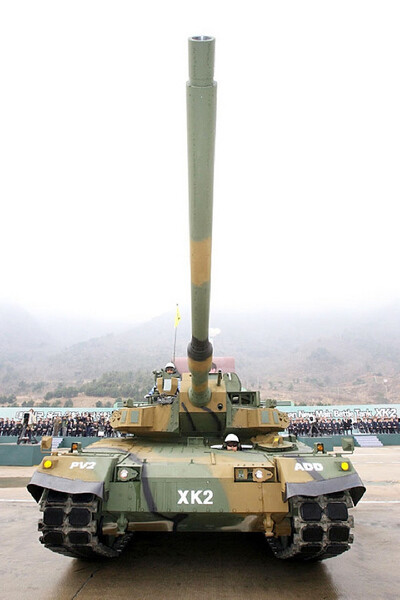hankyoreh
Links to other country sites 다른 나라 사이트 링크
Controversy raging over Defense Minister nominee ties to foreign weapons companies

By Ha Eo-young and Park Tae-woo, staff reporters
Questions are swirling over Minister of National Defense nominee Kim Byung-kwan's record of working as a part-time adviser for UBM Tech, a South Korean brokerage for the German arms company MTU.
Observers are now asking how someone who worked for a foreign arms company that was investigated by South Korean prosecutors could direct the country's military.
Between July 2010 and late 2011, Kim, now 65, served as a part-time adviser at UBM Tech, an importer of tank and warship engines and generators produced by MTU. As a part-time adviser, he earned 70 million won (US$64,900) after taxes.
Military officials are expressing serious reservations about Kim's record of working for a foreign, rather than domestic, weapons brokerage after being discharged from his position in charge of weapons imports and exports during his time in the South Korean military.
"He's been closely involved in weapons imports and imports to promote [South Korea's] defense capabilities, serving as head of director of military power planning division (Major General) for the Joint Chiefs of Staff," said a military source involved with weapons purchasing. "It's hard to fathom why someone like that would have taken a job working for brokers importing weapons from another country. With his background, he should never have been considered as a Cabinet minister."
Another issue for many is the fact that Kim did not use his experience in the military to aid the development and production of weapons by the defense industry like other reserve officers, but instead worked for a company brokering weapons transactions.
A ministry source explained Kim only agreed to serve as an adviser for the process of developing domestic models from German military engines based on his personal relationship with the president of UBM Tech. But another military source said that the company was registered with the Defense Acquisition Program Administration (DAPA) as a weapons broker, not a defense industrial firm.
Some observers are raising questions about the ministry's version of the story, saying that Kim worked exclusively in providing advice on weapons imports, not domestic weapons development.
A military judicial authority source with experience investigating weapons translations said the people who recommended Kim as minister "could not have been unaware" of his work with the brokerage.
"If they knew that and still recommended him, then that's a bigger issue," the source said.
Questions are also swirling over the "part-time" nature of Kim's services.
A source at another weapons brokerage firm said, "Our company has a former general serving as an executive, but he's full-time."
"The full-time executives just focus on one project, while the part-time ones are mainly doing lobbying," the source continued. "That's common practice in this business."
Another issue is the fact that UBM Tech is suspected of lobbying for wasteful weapons imports at taxpayer expense. Last year, the Board of Audit and Inspection (BAI) investigated DAPA for allegedly drafting review materials in which it presented overseas imports of the power pack (engine and transmission) for South Korean-developed K2 tanks as a superior option to domestic development. When German diesel engines - a key component of the power pack - were imported after the late 2011 decision to go with an import, UBM Tech brokered the deal.
In a reference to UBM Tech and similar companies, the BAI said that DAPA "failed to take preventative measures despite knowing that weapons brokers were involved in the purchase of foreign power packs, and also failed to report this fact to the Ministry of National Defense's defense project committee." The case is currently being investigated by the Seoul Central Prosecutors' Office.
Kim's associates said the terms of the Public Service Ethics Act did not apply because he went to work at the company two years after his discharge.
"Germany forbids exports of defense equipment to regions where there are ongoing wars," explained one associate. "He went to work providing advice because if a war broke out, it would create logistics support problems for our military, which uses a lot of German engines."
Please direct questions or comments to [english@hani.co.kr]

Editorial・opinion
![[Column] Is Korean democracy really regressing? [Column] Is Korean democracy really regressing?](https://flexible.img.hani.co.kr/flexible/normal/500/300/imgdb/original/2024/0705/2917201664129137.jpg) [Column] Is Korean democracy really regressing?
[Column] Is Korean democracy really regressing?![[Column] How tragedy pervades weak links in Korean labor [Column] How tragedy pervades weak links in Korean labor](https://flexible.img.hani.co.kr/flexible/normal/500/300/imgdb/original/2024/0703/8717199957128458.jpg) [Column] How tragedy pervades weak links in Korean labor
[Column] How tragedy pervades weak links in Korean labor- [Column] How opposing war became a far-right policy
- [Editorial] Korea needs to adjust diplomatic course in preparation for a Trump comeback
- [Editorial] Silence won’t save Yoon
- [Column] The miscalculations that started the Korean War mustn’t be repeated
- [Correspondent’s column] China-Europe relations tested once more by EV war
- [Correspondent’s column] Who really created the new ‘axis of evil’?
- [Editorial] Exploiting foreign domestic workers won’t solve Korea’s birth rate problem
- [Column] Kim and Putin’s new world order
Most viewed articles
- 110 days of torture: Korean mental patient’s restraints only removed after death
- 2Months after outcry over “torture devices,” Justice Ministry proposes more restraints for immigratio
- 3Beleaguered economy could stymie Japan’s efforts to buoy the yen
- 4[Column] Is Korean democracy really regressing?
- 5Koreans are getting taller, but half of Korean men are now considered obese
- 6[Column] How tragedy pervades weak links in Korean labor
- 7Former bodyguard’s dark tale of marriage to Samsung royalty
- 8Real-life heroes of “A Taxi Driver” pass away without having reunited
- 9[Editorial] Exploiting foreign domestic workers won’t solve Korea’s birth rate problem
- 10Democrats ride wave of 1M signature petition for Yoon to be impeached